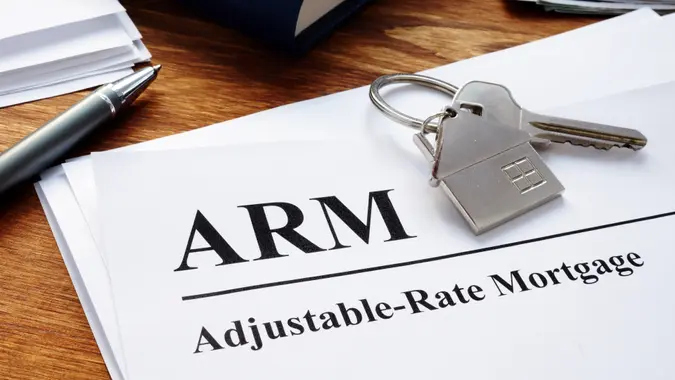4 Things You Need To Consider Before Refinancing Your Mortgage, According to Suze Orman

Commitment to Our Readers
GOBankingRates' editorial team is committed to bringing you unbiased reviews and information. We use data-driven methodologies to evaluate financial products and services - our reviews and ratings are not influenced by advertisers. You can read more about our editorial guidelines and our products and services review methodology.

20 Years
Helping You Live Richer

Reviewed
by Experts

Trusted by
Millions of Readers
Refinancing your mortgage can seem like a smart financial move when interest rates begin to drop. But according to personal finance expert Suze Orman, it’s not as simple as jumping at a lower rate. With rates not dropping particularly low for the foreseeable future, there might not be an opportunity soon, but it’s still good to know what to expect when the time is right.
On a recent episode of her Women & Money podcast, Orman broke down what homeowners need to think about before deciding to refinance.
Refinance Smarter, Not Longer
One of the biggest refinancing mistakes Orman sees is resetting the mortgage term to another 30 years, even if you’ve already paid down several years. This adds time and interest back into your loan, potentially costing more in the long run.
“Then you refinance for another 30 years. So these four or five years that you have been paying on it, you’ve just lost all of that,” she said.
Rule No. 1, if you ever do refinance, she said, “You have to make sure you don’t have the mortgage term longer than the current amount of years left on your mortgage,” she said.
So if you’ve paid five years on a 30-year mortgage, you should only refinance into a 25-year loan, or even shorter, if possible.
Calculate the Break-Even Point
Another key factor to consider is how long it will take for your savings from refinancing to exceed the cost of the refinance itself.
“What is it going to cost you to totally refinance this house? And what will the savings be … between your new mortgage rate and your old? Then you divide that number, the difference, into the cost of refinancing,” she said.
This simple calculation helps you determine your break-even point and how long it will take for your lower monthly payments to cover the upfront cost of the refinance. If you won’t be in the home long enough to reach that point, refinancing may not be worth it.
If it’s going to be between five and seven years and you don’t think you’re going to be in the house that long, “then it makes absolutely no sense to do it,” she said. If you’re looking at just a couple of years and you know you’re planning to stay in the house that long or longer, then you might want to refinance.
Know the Full Financial Picture
Orman cautioned that other details, like whether or not you’ll pay points or how much the closing costs will be, also impact whether refinancing is the right move. It’s not a one-size-fits-all decision.
Her advice is clear, however, don’t refinance just because rates drop slightly. Instead, run the numbers, keep your payoff timeline tight and ensure the savings outweigh the costs over the time you’ll actually live in the home.
Understand the True Cost of Refinancing
In a post for Alliant Credit Union, Orman also broke down the other costs of refinancing. Homeowners should expect to pay between 2% and 6% of the loan amount in closing costs, which may include application fees, appraisals, origination fees, title insurance, inspections and recording charges.
While lenders may offer to roll those fees into your new mortgage, consider whether doing so will actually save you money in the long run or just increase your loan balance.
For example, appraisal fees can range from $500 to $750 (or even higher) while origination fees often fall between 1% and 1.5% of the loan amount. Title insurance and search fees can cost another $500 to $800. These expenses add up quickly, so understanding the full cost upfront is crucial when deciding whether refinancing is worth it.
Overall, refinancing can be a powerful financial tool but only if it’s done with careful planning. As Orman reminded listeners, that means doing your homework before you sign.
 Written by
Written by  Edited by
Edited by 






















